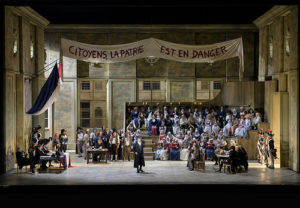
Opera Profile: Umberto Giordano’s ‘Andrea Chénier’
By David SalazarUmberto Giordano will forever be remembered for one opera, “Andrea Chénier.”
The work, which world premiered on March 28, 1896, remains renowned for its sweeping romantic melodies, becoming a major vehicle for the star tenor that is tasked with four major solo passages on top of two extended duets with soprano. The opera’s famed aria “La Mamma Morta” has become a pop culture icon in Jonathan Demme’s “Philadelphia.”
Short Plot Summary
It’s the eve of the French Revolution and servant Carlo Gérard ponders how long the upper class has before it gets toppled. At a party, the poet Andrea Chénier is ridiculed by Maddalena di Coigny and the Comtesse di Coigny. The revolutionaries show up and Gérard joins forces with them. The guests continue their dance, ignoring the rabble.
In the second act, the French Revolution has already taken flight. Roucher implores Chénier to flee as he is being persecuted. He offers Chénier a false passport, but he refuses on the grounds that he is waiting for a mysterious woman who has been sending him letters. Gérard arrives and The Incroyable, a major spy for Robespierre, lets him know that he might know where the woman he has been searching for is. Chénier meets with the mysterious woman, who is Maddalena. They proclaim their love and are about to leave when Gérard stops them. Chénier wounds Gérard and the latter warns him of a terrible fate. Chénier flees and Gérard claims his assailant is unknown to him.
Chénier has been captured by the revolutionaries and is set to be tried. Maddalena begs for his life to Gérard who tries to help. Ultimately Chénier is sentenced to death.
Maddalena, led by Gérard is led to prison where she switches places with another woman so that she can die with her lover. She is reunited with Chénier and the two walk off to get executed together.
Famous Musical Numbers
The opera has a plethora of famed musical moments, none more famous than the aforementioned “La mamma morta,” a searing narrative by Maddalena about how she lost everything. The title character gets his own fair share of major arias, the most famous being “Un di all’azzurro spazio” and “Come un bel di Maggio.”
And of course the baritones famed monologue “Nemico della patria.”
Other Articles on “Andrea Chénier” on OperaWire
Andrea Chénier & Opera’s Greatest Patriotic Revolutionaries
Watch and Listen
Plácido Domingo has always been renowned for his interpretation of the title role and here he is in one of his most famous performances alongside Gabriela Beňačková and Piero Cappuccilli.
Categories
Opera Wiki

